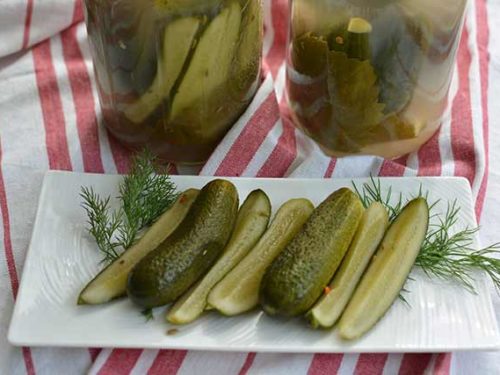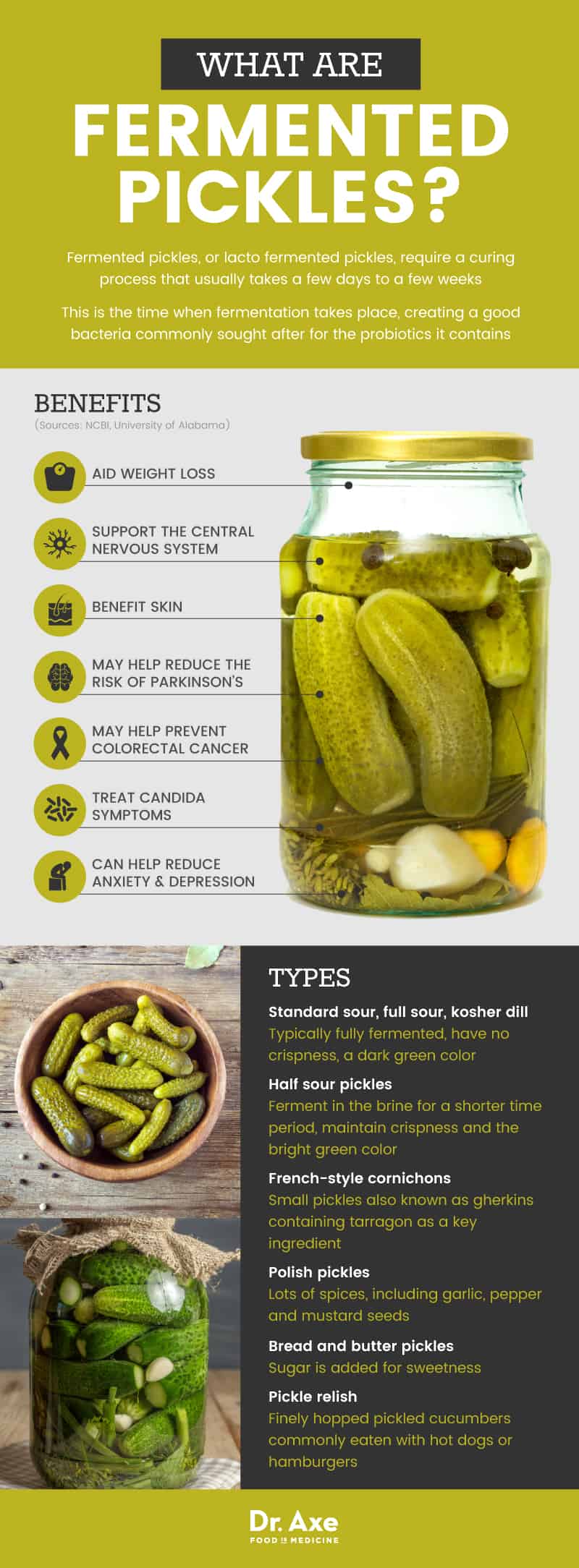Homemade Fermented Cucumber Dill Pickles 124
by Admin
Posted on 07-10-2023 01:50 PM

I absolutely love fermented cucumber pickles, they were probably what initially got me into fermenting, to begin with. I’ve been a pickle lover ever since i was a kid, and love all varieties, including canned vinegar pickles , refrigerator bread and butter pickles , and dill pickles.
 The main difference is that fermented pickles use saltwater brine and
time
to ferment, while other varieties are soaked and pickled in a vinegar solution and canned to be shelf stable. My mom makes awesome sweet bread and butter pickles , and her dill pickles are to die for, but there is something to be said for traditionally fermented cucumber pickles.
The main difference is that fermented pickles use saltwater brine and
time
to ferment, while other varieties are soaked and pickled in a vinegar solution and canned to be shelf stable. My mom makes awesome sweet bread and butter pickles , and her dill pickles are to die for, but there is something to be said for traditionally fermented cucumber pickles.
Last updated on september 21, 2023 let’s make a delicious gut-healthy snack with this easy fermented pickles recipe! making lacto-fermented pickles is a great way to preserve cucumbers from the summer garden (or farmer’s market) to enjoy all year long. If you’ve never fermented anything before, don’t be intimidated. I’ll show you exactly how to make crunchy naturally fermented dill cucumber pickles with this easy step-by-step tutorial – with no heat, no vinegar, no canning… just a simple salt water brine. I love eating fermented pickles with sandwiches, veggie burgers, a cheese board, or just as a tasty snack. If you’re looking for more ways to use or preserve fresh cucumbers, check out our classic vinegar refrigerator pickles recipe or our easy garden tzatziki sauce recipe.
Step 1: wash the cucumbers, slice off 1/16 inch of the blossom end, and soak them in an ice bath for 15-30 minutes to firm and crisp them up. There are enzymes in the blossom end that can make your pickles soft, so be sure to remove them. Step 2: gather your fresh garlic and dill, and pickling spices. Because these fermented pickles are left whole, you want the brine to be extra flavorful. I add a lot of garlic… 10-15 cloves, sometimes 20! fermented garlic is really good for the gut too! step 3: layer the spices, cucumbers, garlic, dill and bay leaves and more cucumbers in a large two-quart jar (half-gallon).
Real fermented pickles are a wonderful culinary journey, different from the world of quick pickling where people simply soak cucumbers in vinegar. A good, lacto fermented pickle recipe harnesses the natural bacteria in the environment to create an acidic environment perfect for fermenting dill pickles. After trying a variety of techniques, we've crafted our very own fermented pickle recipe we're thrilled to share with you. And, since this uses the natural bacteria in your environment, your fermented pickles will possess a distinct flavor unique to your location. You'll be crafting your very own unique fermented pickles recipe. Download our lacto-fermentation recipe book today and embark on the journey of making your fermented pickles at home.
What’s the Difference Between Fermented Pickles and Regular Pickles?
Seeing how some recipes for fermented pickles call for as little as 2. 5% salt level, i decided to do some experimenting and see for myself. I fermented three jars of pickles with the only difference being the salt level. Spices and seasonings, fermentation temperature and fermentation time were identical. I picked at 2. 5%, 3. 5% and 4. 5% salt levels. I could do 4% but i thought that 3. 5% and 4% would be too close to judge effectively.
 Five percent seems too high to attempt when not planning on canning the pickles. All three kinds were fermented for 8 days.
Five percent seems too high to attempt when not planning on canning the pickles. All three kinds were fermented for 8 days.
While there is certainly enough room in my heart for both fermented pickles and my beloved great-grandmother's mustard pickle recipe , fermented pickles have not been heated and the naturally occurring enzymes and beneficial vitamins are still fully present (even heightened!). When you water bath can pickles in a vinegar brine, you're essentially killing all organisms that may cause the pickles to spoil when stored at room temperature. Even refrigerator pickles are different than fermented pickles. The difference here is you still pour a hot vinegar-based brine over the pickles, but instead of water bath canning them, they're placed in the refrigerator.
When it comes to choosing foods that have a positive impact on your overall health, fermented foods have certainly earned a position near the top of that list. Yogurt, the most famous of health-promoting fermented foods, has been around for about 7,000 years. In the east, the process of fermenting vegetables to make sauerkraut, kimchi, and other ancient health foods, has been around for over 2,000 years. These plant-based fermented products have gained popularity around the globe more recently, leading many to wonder if other acidic veggie snacks like pickles are also the result of fermentation. But the answer to the question, “are pickles fermented?,” isn’t as straightforward as you might think.